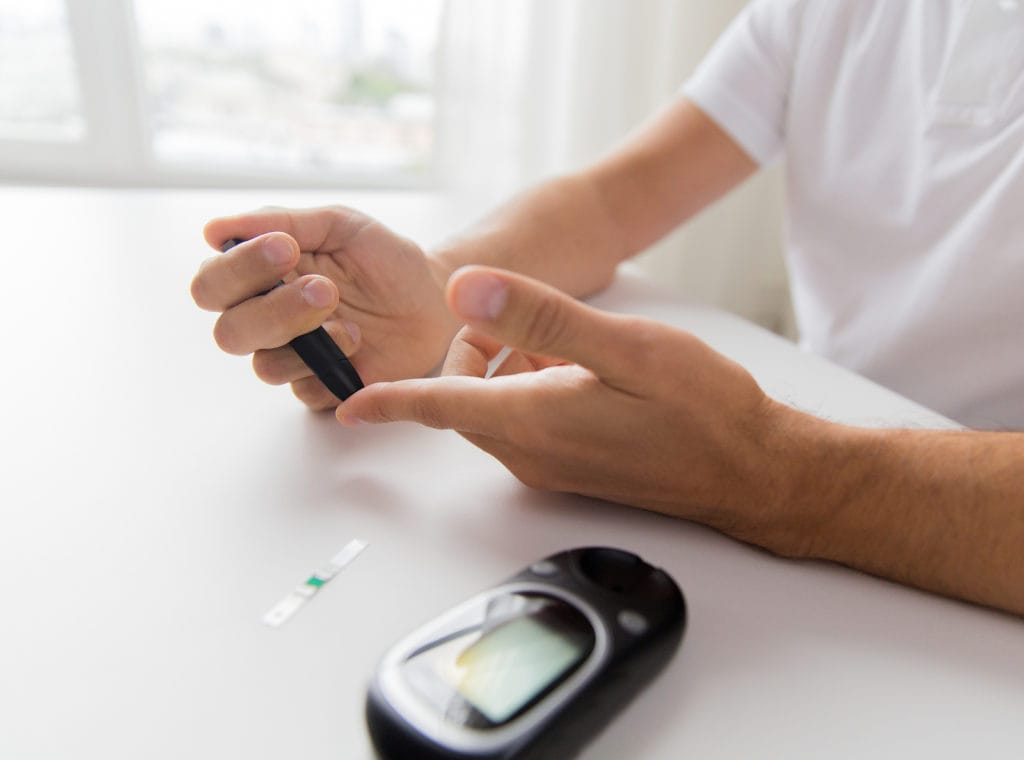Diabetics' Health
Diabetics have a higher risk of developing other health conditions, and may take multiple medications to meet their various health needs. It's important to know how these medications interact with one another and whether they put a patient at risk for dangerous adverse reactions.
About Diabetics' Health

Over 29 million Americans have diabetes, a disease that causes a person’s blood sugar levels to become too high. If you have been diagnosed with diabetes, it is important that you visit your doctor regularly (every three to six months) to check in on your health and identify any areas of concern. Diabetics often face increased risks for other health issues, such as heart disease and stroke. Untreated diabetes can lead to damage to the kidneys, eyes, teeth, gums, nerves. In some cases untreated diabetes can lead to potentially fatal diabetic ketoacidosis. This makes continuous diabetes care all the more important.
There are many ways to regulate your diabetes. Research even shows that it is possible for patients with type 2 diabetes to experience a reversal of their disease. While type 1 diabetes is not reversible, it is manageable.Those with type 1 diabetes will need to closely monitor their blood sugar levels and take insulin as needed, usually several times a day. Healthy eating, exercising, and weight management all play important roles in keeping both types of diabetes under control.
Your doctor may prescribe medications to help treat your diabetes or other coexisting health conditions. Prescription drugs may improve your health, but it is important to note that drug manufacturers do not always test their medications with diabetics in mind. As such, it is sometimes unclear how drugs will affect diabetics until after the medications have entered the marketplace. Before taking a new medication, make sure you’re aware of its known side effects and alert your doctor immediately if you experience any abnormal symptoms.
How Drugs can Impact Diabetics' Health
Medications may play a major or minor role in your diabetes treatment plan, depending on what type of diabetes you have and whether you are experiencing any other health conditions. For example, patients with type 1 diabetes will need to take insulin multiple times per day whereas patients with type 2 diabetes may not need to take insulin at all. Some patients are able to control their diabetes through diet and exercise alone. Others may need to take additional medications to help lower their blood sugar levels, treat high blood pressure, or reduce their cholesterol.
Taking multiple drugs to address your health needs is known as polypharmacy, and may lead to an increase in the number of side effects that you experience. Polypharmacy can also cause negative interactions between the different drugs or lead to an overdose of an active ingredient. Negative interactions are not limited to prescription medications. Over-the-counter medicines or dietary supplements like vitamins may also interact with your prescription medications and cause you to experience serious side effects.
You may be seeing multiple doctors or specialists to meet different aspects of your health care needs. If this is the case, be sure to inform each of your doctors of all medications and supplements that you’re taking in order to minimize risks associated with polypharmacy.
Blood Sugar Medications
 Type 2 diabetes is often diagnosed through the hemoglobin A1C test, which measures the amount of sugar in your bloodstream. Normal blood sugar levels fall below 5.7 percent; A1C levels of 6.5 percent or higher indicate type 2 diabetes. Many people with type 2 diabetes rely on blood sugar medications to help manage their high blood sugar levels. However, the FDA has issued warnings about several types of blood sugar medications, and their pharmaceutical manufacturers face lawsuits pertaining to their serious side effects.The most serious of these claims include pancreatitis, diabetic ketoacidosis, rhabdomyolysis, and kidney failure.
Type 2 diabetes is often diagnosed through the hemoglobin A1C test, which measures the amount of sugar in your bloodstream. Normal blood sugar levels fall below 5.7 percent; A1C levels of 6.5 percent or higher indicate type 2 diabetes. Many people with type 2 diabetes rely on blood sugar medications to help manage their high blood sugar levels. However, the FDA has issued warnings about several types of blood sugar medications, and their pharmaceutical manufacturers face lawsuits pertaining to their serious side effects.The most serious of these claims include pancreatitis, diabetic ketoacidosis, rhabdomyolysis, and kidney failure.
Most blood sugar medications created for type 2 diabetics are taken orally; others, including Byetta, are injectable. Blood sugar medications differ in type and function. There are nine types of oral blood sugar medications alone. Some are classified as inhibitors, targeting and slowing down certain enzymes in the body. Others may increase your body’s sensitivity to its own natural hormones. There are also drugs, classified as incretin mimetics, that mimic your body’s hormones. Some oral blood sugar medications, such as the prescription drug Januvia, fall into multiple categories.
The different classes of blood sugar medications are associated with health risks and side effects unique to their properties. SGLT-2 inhibitors like Invokana may lead to too much acid in the blood, a potentially fatal condition known as diabetic ketoacidosis. The FDA is also investigating reports that incretin mimetic drugs, including Januvia and Byetta, increase patients’ risk of developing pancreatitis and precancerous cells. Common side effects for blood sugar medications include nausea, headaches, and weakness. Sometimes symptoms appear after you are no longer taking a medication. Alert your doctor if you are experiencing unusual health complications after taking a blood sugar medication.
Blood Pressure Medications

Research conducted by the American Diabetes Association in 2012 showed that over 70% of adults with diabetes had high blood pressure or were using hypertension medications to lower their blood pressure. High blood pressure is especially concerning for patients with diabetes because it increases your risk of experiencing blood vessel damage, heart complications, heart attacks, and strokes, as well as the risk of diabetic kidney failure. Blood pressure medications work to combat that risk by helping you achieve a lower and healthier blood pressure.
In addition to lowering blood pressure, some hypertension medications have been connected to serious side effects in users. For instance, case studies conducted by the Mayo Clinic in 2012 linked the prescription medication Benicar to severe diarrhea, significant weight loss, and sprue-like enteropathy. Some patients required hospitalization to treat these symptoms, but improved in health after they stopped taking the medication. If you are taking Benicar and experience extreme weight loss or diarrhea, inform your doctor immediately so that he or she can find an alternative treatment plan that better meets your health needs.
Cholesterol Medications
 Diabetic dyslipidemia is a common diabetic condition that causes your body to lower your LDL, or “good” cholesterol levels, while increasing your levels of HDL, or “bad,” cholesterol. The American Diabetes Association recommends checking your cholesterol levels at least every five years, and increasing the frequency of your checks if you and your doctor have identified a cholesterol problem. Fortunately, there are many ways to improve your cholesterol. Chief among them are committing to a healthy diet low in cholesterols and fats, and exercising regularly.
Diabetic dyslipidemia is a common diabetic condition that causes your body to lower your LDL, or “good” cholesterol levels, while increasing your levels of HDL, or “bad,” cholesterol. The American Diabetes Association recommends checking your cholesterol levels at least every five years, and increasing the frequency of your checks if you and your doctor have identified a cholesterol problem. Fortunately, there are many ways to improve your cholesterol. Chief among them are committing to a healthy diet low in cholesterols and fats, and exercising regularly.
A cholesterol-lowering prescription drug may also prove to be a valuable asset in taking control of your cholesterol levels. Cholesterol medications like Lipitor are used to treat high cholesterol in both diabetics and non-diabetics alike. However, some nondiabetic patients who have used Lipitor to control their cholesterol levels developed diabetes after taking the drug. These users are holding the manufacturing company, Pfizer, responsible for withholding information that using Lipitor can affect your blood sugar levels. Updates made to the drug’s safety labelling reflect the risk of increased blood sugar levels as well as user reports of cognitive impairment, liver damage, and pancreatitis after taking Lipitor.
It has become clear that it is not just the use of Lipitor, but the use of any statin, that can increase consumers’ risk of developing diabetes. Statins continue to be prescribed to lower cholesterol levels in diabetic patients, as the FDA believes that their health benefits outweigh their risks. Muscle damage and liver damage are among the most common negative side effects of statin use. Some statins, like Zocor, have even been associated with kidney failure in severe cases. Keep your doctor informed of any negative side effects you may be experiencing while taking statins or other medications you are using to treat your diabetes.
Learn More about Drugs and Devices that Affect Diabetics
Find additional information about how prescription drugs and medical devices may be affecting your well-being. If you have experienced complications from diabetes medications, get help by scheduling a free legal consultation today.
Last Edited: March 14, 2017